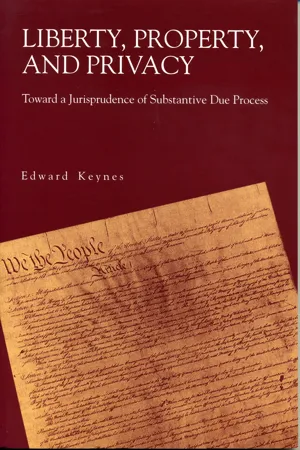
Liberty, Property, and Privacy
Toward a Jurisprudence of Substantive Due Process
- English
- PDF
- Available on iOS & Android
About this book
In this book, Edward Keynes examines the fundamental-rights philosophy and jurisprudence that affords constitutional protection to unenumerated liberty, property, and privacy rights. He is critical of the failure of the U.S. Supreme Court to adopt a coherent theory for identifying which rights are to be considered fundamental and how these private rights are to be balanced against the public interests that the government has a duty to articulate and promote. Keynes develops his argument by first surveying how substantive due process grew out of the tradition of Anglo-American jurisprudence and came to evolve over time. He pays special attention to the shift in its application early in the twentieth century, from protecting "liberty of contract" against economic regulation to protecting "privacy" and other noneconomic rights (as in Roe v. Wade) against social regulation.
Frequently asked questions
- Essential is ideal for learners and professionals who enjoy exploring a wide range of subjects. Access the Essential Library with 800,000+ trusted titles and best-sellers across business, personal growth, and the humanities. Includes unlimited reading time and Standard Read Aloud voice.
- Complete: Perfect for advanced learners and researchers needing full, unrestricted access. Unlock 1.4M+ books across hundreds of subjects, including academic and specialized titles. The Complete Plan also includes advanced features like Premium Read Aloud and Research Assistant.
Please note we cannot support devices running on iOS 13 and Android 7 or earlier. Learn more about using the app.
Information
Table of contents
- Cover
- Title
- Dedication
- Copyright
- Contents
- Acknowledgments
- Introduction
- 1. The Core Constitutional Values: Life, Liberty, and Property
- 2. Antecedents of the Fourteenth Amendment’s Core Values
- 3. Framing the Fourteenth Amendment
- 4. Congressional Protection of Fundamental Rights in the Reconstruction Era
- 5. The Supreme Court, the Public Interest, and Economic Liberty, 1873–1921
- 6. The Much-Acclaimed Demise of Substantive Due Process, 1921–1991
- 7. Liberty and Privacy—Marriage and the Family
- 8. Reproductive Liberty and Individual Autonomy—Contraception and Abortion
- Epilogue
- Table of Cases
- Index
- About the Author